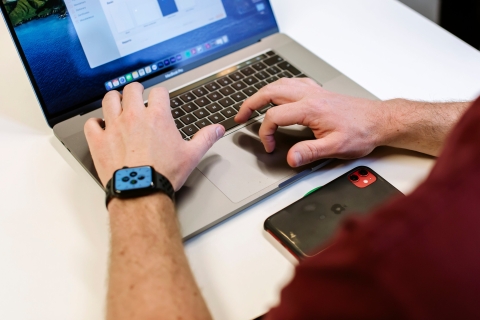

Gaining experience
Psychology
It is essential to have work experience before applying to postgraduate psychology programs. You should start building your experience as early as possible, as you'll likely need to work voluntarily before you have enough experience to apply for a paid job.
The connections and skills you gain through your work experience will support you in your next steps.
Experience based on your area of Psychology
Below are ways you can gain experience in your specific area of interest in psychology.
Working as an assistant psychologist or research assistant psychologist is the best starting point if you wish to become a Clinical Psychologist.
You can find work experience in different settings such as:
- hospitals
- local clinics and health centres
- care homes
- community mental health teams
- social services, schools and prisons
Try to look for work experience that allows you to work with different groups of people as this can help you build up your portfolio of experience.
Roles which give you clinical experience
- Care worker
- Assistant/support worker in various settings (e.g. community mental health, learning disability service)
- Teaching assistant in special schools (working with children with learning disabilities)
- Volunteer in a variety of roles such as helpline assistant, befriender, project worker with clients with disabilities / mental health issues: (e.g. MIND, Relate, SANE, Drug helpline)
Resources for finding work opportunities
- Jobs in Psychology - contains an array of job opportunities for graduates.
- NHS jobs - useful career information and advice for job roles and entry requirements, and a jobs board for careers in the NHS in England.
- Nacro - a national social justice charity operating in England and Wales.
- Mind - mental health charity. Check their latest vacancies.
- Police recruitment - routes into policing and more information on entry programmes requirements and eligibility.
Work experience in a forensic setting is particularly important in forensic psychology. You'll have an advantage if you can showcase that you have mentored young offenders or carried out voluntary work with organisations that offer victim support.
Roles which give you forensic experience
- volunteering/working with youth offending service
- working with people with substance misuse problems
- working in rehabilitation services
- involvement with prison visitor schemes
- assistant psychologist in a forensic setting
- working in prisons/secure units
- research assistant in a relevant area/perhaps as part of your final year project
- youth worker
- befriender
- helpline volunteer – e.g. with organisations such as Drug helpline
Resources for finding work opportunities
- Jobs in Psychology - advertises a range of job opportunities for graduates.
- Nacro.org - National Association for the Care and Resettlement of Offenders providing challenging opportunities to progress with your career.
- Justice.gov - Current vacancies, volunteering opportunities and information about careers within the justice system.
- Victim Support - Charity giving free and confidential help to victims of crime, witnesses, their family and friends.
- Civil Service website - Find jobs in the Civil Service and central government organisations.
- HM Prison and Probation service - Find out more about roles, process, eligibility and training and apply.
- NHS jobs - Information service for careers in the NHS in England.
You should demonstrate that you've gained relevant experience working with children and young people. This could be within education, social care, childcare, or a health and community setting.
Roles which can give you relevant experience
- volunteering in a variety of areas/organisations which focus on service provision for children and young people such as Barnardo’s, NSPCC
- holiday club worker
- classroom helper (special needs) in a school
- learning mentor
- child-minder or play worker in early years setting
- camp counsellor/residential carer (e.g. National Citizen Service programme)
- care worker
- social work assistant
- befriender
- assistant to a psychologist researcher or a PhD student in your Faculty
Resources for finding work opportunities
Work experience in private, public and government organisations is useful in preparing for a career in occupational psychology particularly in human resources, training or management consultancy projects. Taking part and developing new assessment centres for psychometric test publishers provides valuable experience for this area of psychology.
Roles which can give you relevant experience
- temping in an administrative role
- work within an HR/personnel department
- administration support
Resources for finding work opportunities
- Jobs in Psychology – jobs website from the British Psychological Society to help you find work opportunities in the area
- Occupational Psychologist profile - Prospects - useful information about entry requirements and career training information and employers
- People Management Jobs - useful jobs board to find job opportunities
- Psychometric test publishers including The Morrisby Organisation and Pearson Assessments
- BPS Directory of Providers of Assessment and Training - you can use the Directory of Providers (Assessment/Training) to find a training provider to take part and/or help develop new assessments/trainings.
- Personnel Today - jobs HR jobs board
- The OPC - provider of tests and consultancy across all business and industry sectors, with particular expertise in transport, safety, general management and customer services
Work opportunities in a supportive role, especially in mental health, offer valuable experience. It's difficult to source paid counselling experience before you qualify, but many organisations provide excellent training and support to their volunteers. Search for opportunities in the not for-profit, and health services sectors.
Roles which can provide counselling experience
- Volunteering for organisations such as Relate, Childline, Release, Mind, Off the Record/Samaritans
- Working in a capacity where you are providing some advice and information e.g. Citizen Advice Bureau
- Mentoring schemes
Resources for finding work opportunities
- British Association for Counselling and Psychotherapy
- NHS jobs - useful career information on job roles and entry requirements, as well as a jobs board for careers in the NHS in England.
- Health Jobs - a jobs board with a variety of roles across the health care sector.
- Health Service Journal - jobs board that gives you access to the private, public and not for profit organisations and a wide range of healthcare jobs.
- Pulse jobs - a leading UK recruitment agency with temporary and permanent healthcare jobs and the widest choice of shifts across the NHS and private healthcare sector.
You can find relevant experience through health promotion departments in your local council, through local health groups, or with your local doctors’ surgery.
You can also help in hospitals or other healthcare organisations, such as Healthwatch, to understand and respond to the psychological needs of patients and their families.
Aim to get experience in a hospital environment; or some have formal work shadowing where you can work alongside health visitors, speech and language therapists, and healthcare support workers.
Roles which can provide relevant health psychology experience
- worker in a variety of health care settings such as hospitals or working alongside health visitors
- care assistant in a care home or hospice
Some paid care home positions are available on the MyCareer.
Resources for finding work opportunities
- BPS Division of Health Psychology
- NHS Careers
- NHS Authorities and Trusts
- Pulse jobs
Experience in coaching and PE teaching is advantageous, and you can start obtaining extra qualifications whilst still at university. UoP Sport offers coaching internships and qualifications. You could also enquire about other qualifications such as the British Association of Sports and Exercise Sciences.
Roles which can provide relevant experience
- coaching experience (team and/or individual)
- PE teaching
- volunteering experience on fitness and exercise programmes
- placement opportunities alongside your studies
Resources for finding work opportunities
- British Association of Sports and Exercise Sciences (BASES) - the professional body for sport and exercise sciences in the UK.
- Active Camps - organisation offering multi-sport and activity holiday camps for children aged 5-16 years.
- UK National Strength and Conditioning Association - the Professional Body for Strength and Conditioning in the UK advertising jobs and opportunities.
To become a Neuropsychologist you first need to be a Chartered Psychologist within the field of clinical or educational psychology as this is a post-qualification discipline.
For more information on the routes of how to get into Neuropsychology please check the BPS Division of Neuropsychology.
Types of opportunities
Placements
Placements will give you a long-term look at an organisation, and help you to build contacts and experience.
On some degrees, work placements are part of the programme, whilst on others you can choose to complete a placement as one of your modules. Should you choose to undertake either your first point of contact is your placement team.
Learn more about taking a placement
Volunteering
It is worth considering the voluntary sector for work experience. Voluntary work with community art initiatives can be valuable. Seize any opportunity to get involved in local community projects to help you develop your work experience. Our Volunteering Bank provides local opportunities to undertake alongside your studies.
You can also get involved in relevant university projects through the different groups and societies via the Student Union. This is a good way of demonstrating your motivation and interest in this area of work.
Learn more about our Volunteering Team

Speculative applications
Speculative applications involve sending a CV and cover letter to an employer to ask if they have any vacancies, even if the company is not currently advertising for a role. They're a great way to access "hidden jobs" that go unadvertised. The Directory of Chartered Psychology can be a used as a source of contacts to find people working in a specialism that interests you.
Submitting a speculative application shows your interest in a specific company and your willingness to go above and beyond to develop your skills and understanding of the industry.
Enable University alerts
Turn on notifications for critical updates like closures, safety alerts, and urgent service disruptions.








